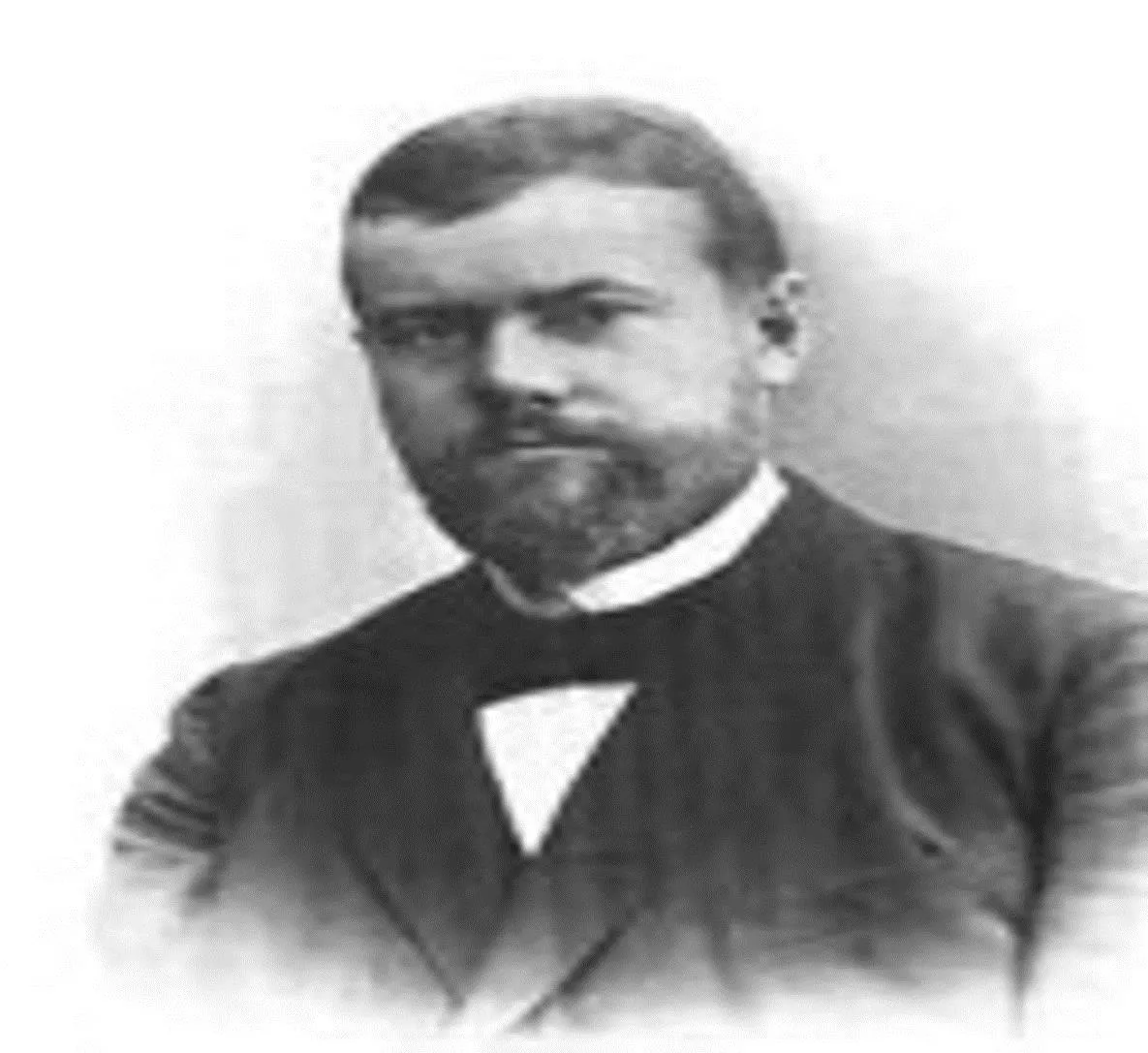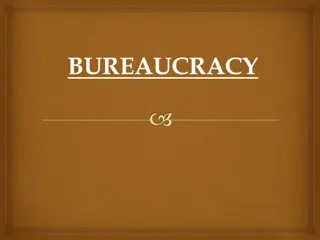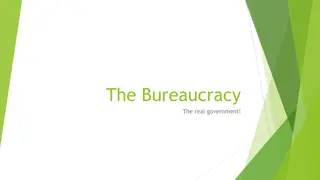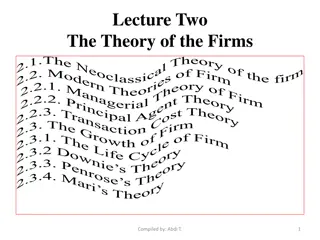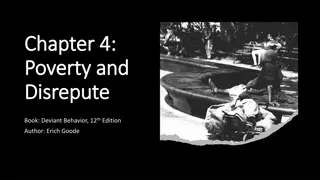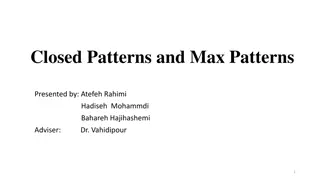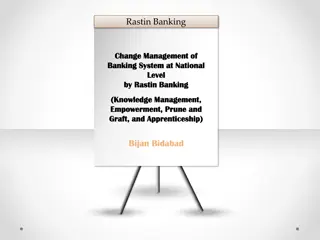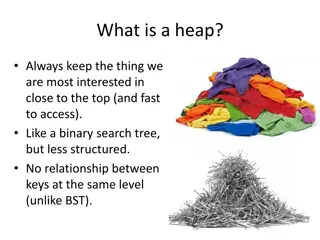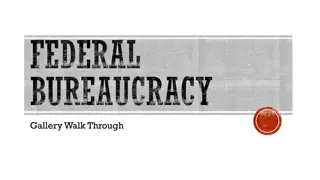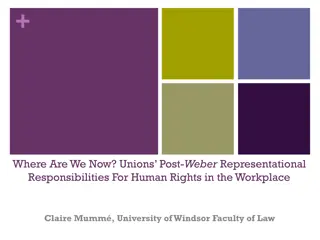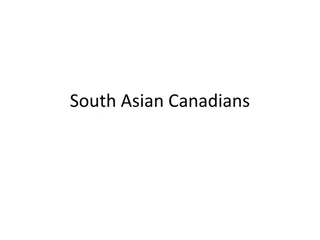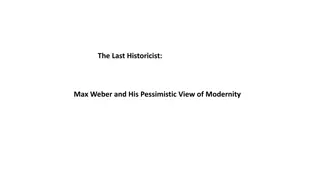Max Weber's Bureaucracy Theory
Max Weber, a renowned sociologist and political economist, developed the Theory of Bureaucracy in the early 20th century to address the challenges of industrial revolution in Germany. His principles emphasized efficiency and effectiveness in organizational administration. Despite some misconceptions and abuse, the concept of bureaucracy remains a crucial aspect of public administration, exploring the types of legitimate authority and the concept of domination.
Download Presentation

Please find below an Image/Link to download the presentation.
The content on the website is provided AS IS for your information and personal use only. It may not be sold, licensed, or shared on other websites without obtaining consent from the author.If you encounter any issues during the download, it is possible that the publisher has removed the file from their server.
You are allowed to download the files provided on this website for personal or commercial use, subject to the condition that they are used lawfully. All files are the property of their respective owners.
The content on the website is provided AS IS for your information and personal use only. It may not be sold, licensed, or shared on other websites without obtaining consent from the author.
E N D
Presentation Transcript
INTRODUCTION TO PUBLIC ADMINISTRATION INTRODUCTION TO PUBLIC ADMINISTRATION BUREAUCRACY BUREAUCRACY
Max Weber 1864 Max Weber 1864 - -1920 1920
The Theory of Bureaucracy The Theory of Bureaucracy Max Weber (1864 1920) wrote at the turn of the twentieth century, when Germany was undergoing its industrial revolution. To help Germany manage its growing industrial enterprises at a time when it was striving to become a world power, Weber developed the principles of bureaucracy Bureaucracy may be defined as a formal system of organization and administration designed to ensure efficiency and effectiveness. A bureaucratic system of administration is based on five principles
Bureaucracy: Max Weber Bureaucracy: Max Weber He was Sociologist and Political Economist It was untapped relevant theory except in Germany It was not translated until 1922 and was still done in a fragmented and disjointed manner It was initially used out of context and misinterpreted.
Bureaucracy abused? Bureaucracy abused? The terms bureaucrat, bureaucratic, and bureaucracy are clearly invectives. Officials rarely address themselves as bureaucrats or their methods of management bureaucratic. These words are mostly applied with a negative connotation. They always imply a reproachful criticism of persons, institutions, or procedures. The abusive implication of the terms in question is not limited to Ghana an other African countries. It is a universal phenomenon
The concept of Domination The concept of Domination Probability that certain specific commands will be obeyed by a group of persons. The claims to legitimacy. Does not always imply any form of obedience of exercising influence and authority. But there must be a minimum of voluntary compliance. There must be an interest to obey -
Types of Authority Types of Authority There are three pure types of legitimate domination which is based on three distinct grounds namely: Rational ground rest on a belief in the legality of enacted rules and the right of those elevated to authority under such rules to issue commands Traditional grounds rest on an established belief in the sanctity of immemorial traditions and the legitimacy of those exercising authority under them, or Charismatic grounds rest on devotion to the exceptional sanctity, heroism or exemplary character of an individual person, and of the normative the normative patterns or ordeal revealed or ordained by him.
Three types of Authority Three types of Authority The above grounds translate into three types of authority. These are: Traditional authority Rational-legal authority Charismatic authority
Cont. Each authority has its own administrative structure But only the traditional and legal rational are stable enough to provide a firm foundation for a permanent administrative structure And the traditional structures are gradually given way to rational- legal structures Charismatic authority arise in periods of instability and crises when individuals believed to possess special gift of mind and spirit emerge to offer extra-ordinary measures.
Routinization of charisma Routinization of charisma For charismatic authority to persist, it must move towards one of the other two stable forms. To means more participants are included in the leadership and Voluntary support gives way to systematic one Relationships move from personal to a more formal and impersonal relations
Principles of bureaucracy Principles of bureaucracy In a bureaucracy, a manager s formal authority derives from the position he or she holds in the organization. Authority is the power to hold people accountable for their actions and to make decisions concerning the use of organizational resources. Authority gives managers the right to direct and control their subordinates behavior to achieve organizational goals. In a bureaucratic system of administration, obedience is owed to a manager, not because of any personal qualities that he or she might possess such as personality, wealth, or social status but because the manager occupies a position that is associated with a certain level of authority and responsibility
Principle 2: Principle 2: In a bureaucracy, people should occupy positions because of their performance, not because of their social standing or personal contacts. This principle was not always followed in Weber s time and is often ignored today. Some organizations and industries are still affected by social networks in which personal contacts and relations, not job-related skills, influence hiring and promotional decisions.
Principle 3: Principle 3: The extent of each position s formal authority and task responsibilities, and its relationship to other positions in an organization, should be clearly specified. When the tasks and authority associated with various positions in the organization are clearly specified, managers and workers know what is expected of them and what to expect from each other. Moreover, an organization can hold all its employees strictly accountable for their actions when each person is completely familiar with his or her responsibilities.
Principle 4: Principle 4: So that authority can be exercised effectively in an organization, positions should be arranged hierarchically, so employees know whom to report to and who reports to them. Managers must create an organizational hierarchy of authority that makes it clear who reports to whom and to whom managers and workers should go if conflicts or problems arise. This principle is especially important in the armed forces, and other organizations that deal with sensitive issues involving possible major repercussions. It is vital that managers at high levels of the hierarchy be able to hold subordinates accountable for their actions.
Principle 5: Principle 5: Managers must create a well-defined system of rules, standard operating procedures, and norms so that they can effectively control behavior within an organization. Rules are formal written instructions that specify actions to be taken under different circumstances to achieve specific goals. Standard operating procedures (SOPs) are specific sets of written instructions about how to perform a certain aspect of a task. A rule might state that at the end of the workday employees are to leave their machines in good order, and a set of SOPs then specifies exactly how they should do so, itemizing which machine parts must be oiled or replaced.
Cont. Cont. Norms are unwritten, informal codes of conduct that prescribe how people should act in particular situations. For example, an organizational norm in a restaurant might be that waiters should help each other if time permits. Rules, SOPs, and norms provide behavioral guidelines that improve the performance of a bureaucratic system because they specify the best ways to accomplish organizational tasks.
Cont. Cont. Companies such as customer oriented businesses have developed extensive rules and procedures to specify the types of behaviors that are required of their employees, such as, Always greet the customer with a smile. Weber believed that organizations that implement all five principles will establish a bureaucratic system that will improve organizational performance.
Cont. The specification of positions and the use of rules and SOPs to regulate how tasks are performed make it easier for managers to organize and control the work of subordinates. Similarly, fair and equitable selection and promotion systems improve managers feelings of security, reduce stress, and encourage organizational members to act ethically and further promote the interests of the organization.
Features of ideal type of bureaucracy Features of ideal type of bureaucracy A formal hierarchical structure: Each level controls the level below and is controlled by the level above. A formal hierarchy is the basis of central planning and centralized decision making Organization by functional specialty: Work is to be done by specialists, and people are organized into units based on the type of work they do or skills they have Rules governing performance Separation of personal from official property and rights Recruitment is based on technical competence Security of tenure Promotion by merit and/or seniority
Advantages of Bureaucracy Advantages of Bureaucracy Order Predictability Stability Professionalism Standardization and Consistency
Bureaucratic Dysfunctions Bureaucratic Dysfunctions According to R. Merton Bureaucracies have inherent dysfunction and pathological elements that make them inefficient in operations. Bureaucracies encourage blind conformity exert constant pressure on people to be methodical and disciplined to conform to patterns of obligation. The double bind of bureaucracy one cannot get a job without experience but there cannot be experience without having a job.
Cont. Cont. The structure stresses depersonalized relations, and power and authority gained by virtue of organizational position rather than by thought or action. Implies that ideas and opinions are valued not according to their intrinsic merit but according to one s rank/title/grade/status. But is it a fact that bosses are smatter than their subordinates? Sometimes, managers allow rules and SOPs bureaucratic red tape to become so cumbersome that decision making becomes slow and inefficient and organizations are unable to change. When managers rely too much on rules to solve problems and not enough on their own skills and judgment, their behavior becomes inflexible. Slow decision making due to strict application of rules Administrators become so powerful and can obstruct administrative processes to achieve their personal interest
conclusion conclusion Definition Domination Authority Principles Features Advantages Limitation
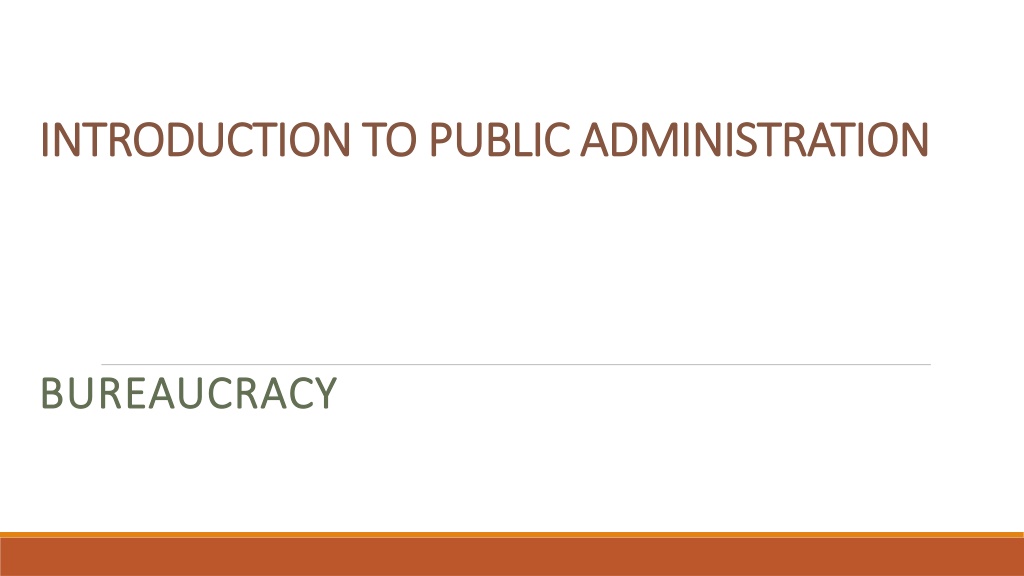
 undefined
undefined






